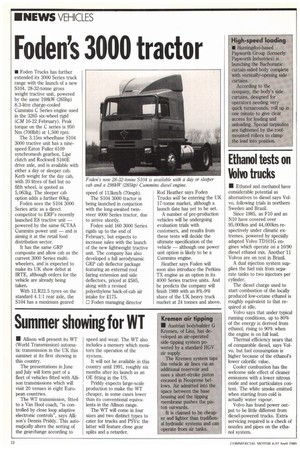Ethanol tests on Volvo trucks
Page 14

If you've noticed an error in this article please click here to report it so we can fix it.
• Ethanol and methanol have considerable potential as alternatives to diesel says Volvo, following trials in northern Sweden and Brazil.
Since 1985, an F10 and an N10 have covered over 95,000km and 44,000km respectively under climatic extremes, powered by specially adapted Volvo TD101G engines which operate on a 10/90 diesel ethanol mix. Another 11 Volvos are on test in Brazil.
A dual injection system supplies the fuel mix from separate tanks to two injectors per cylinder.
The diesel charge used to start combustion of the locally produced low-cetane ethanol is roughly equivalent to that required at idle.
Volvo says that under typical running conditions, up to 80% of the energy is derived from ethanol, rising to 90% when the engine is on full load.
Thermal efficiency nears that of comparable diesel, says Volvo, but fuel consumption is higher because of the ethanol's lower calorific value.
Cooler combustion has the welcome side effect of cleaner emissions with a lower nitrous oxide and soot particulates content. The white smoke emitted when starting from cold is actually water vapour.
Volvo has found power output to be little different from diesel-powered trucks. Extra servicing required is a check of nozzles and pipes on the ethanol system.




















































































































